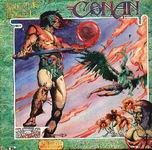
 Robert E. Howard’s Conan – The Tower Of The Elephant & The Frost Giant’s Daughter
Robert E. Howard’s Conan – The Tower Of The Elephant & The Frost Giant’s Daughter
Adapted by Roy Thomas & Alan B. Goldstein; Performed by a FULL CAST
33 1/3 RPM LP – Approx. 46 Minutes [AUDIO DRAMATIZATION]
Publisher: Moondance Productions
Published: 1975
Themes: / Fantasy / Aliens / Battle / Mythology / Gods /
Alan B. Goldstein had a dream, to bring the Robert E. Howard 1930s pulp magazine hero, Conan The Cimmerian, to audio. In 1974 he contacted Glenn Lord, agent for Howard’s literary estate and proposed a radio series based on Conan. Permission was granted and a pilot was adapted from one of Howard’s shortest Conan tales – “The Frost Giant’s Daughter”. After the pilot was completed, Goldstein brought it to Marvel Comics editor Roy Thomas. Thomas loved it and expressed an interest in contributing to the project. So together, with Alan B. Goldstein working as producer and Roy Thomas scripting, they decided that a second Conan audio adventure should be made.
Actors Owen McGee and Paul Falzone were again hired to reprise their roles as “The Narrator” and “Conan” respectively. And thus was born the second audio dramatization “The Tower Of The Elephant”. Unfortunately their vision of a Conan radio series was dashed. By the late 1970s, radio dramas were virtually dead. Only these two stories were ever adapted for the aborted Conan radio series. But Goldstein would go on to produce at least one more Conan record – but that, my Hyborian friends, is another story.
Side One – “The Tower Of The Elephant” – 27 Minutes 29 Seconds
Conan is in Zamoria’s City Of Thieves, Arenjun, where in a local tavern he overhears a boastful kidnapper. Before dispatching the cur Conan discovers the whereabouts of The Tower of the Elephant and of the fabled jewel rumored to be secured within it. Soon after Conan is at that bejeweled tower, determined to rob it of it’s jewel – but he has much to contend with – he must surpass another thief, ravenous lions and a giant spider. And what he finds in the tower’s interior is like nothing else in this age undreamed of. Howard’s prose is frothy, wondrous and direct. The performances here are letter perfect and the power of the original short story is successfully translated.
Side Two – “The Frost Giant’s Daughter” – 17 Minutes 41 Seconds
This, the shorter of the two dramatizations, again takes its stylistic cues from Howard’s pulp roots; nearly every word of this adaptation is taken directly from the original text itself. “The Frost Giant’s Daughter” is set in the high mountains that border Vanaheim and Aesgard where Conan has just fought a fierce battle, lying exhausted and near death on the battlefield, a near-naked woman suddenly visits him. Her voluptuous body re-ignites his will to live but when she mocks him, he chases her for seeming endless leagues across the snow-covered mountains. Conan finds it strange that she does not seem to feel the cold that chills his bones, dressed as she is shouldn’t she be frostbitten? Of course it is all a trap, this “woman” is no mortal, she’s lead Conan to her two massively dangerous looking “brothers”. The performances and narration paint a vivid mental film full of both preternatural storytelling and mythological virtue. Structured more as an incident than a plotted adventure the layered mythology of Howard’s invented Hyborian world casts a spell upon the listener. We feel Conan’s weariness and we follow along hotly in his footsteps as he’s tempted by that fleet-footed Valkyrie. It all has a dream like quality and it’s juicily full of pulpy goodness. I truly wish Alan B. Goldstein had got his dream and these two audio adventures had become the first two episodes in the Conan radio series.
Posted by Jesse Willis

 Snow Crash
Snow Crash Eaters of The Dead
Eaters of The Dead